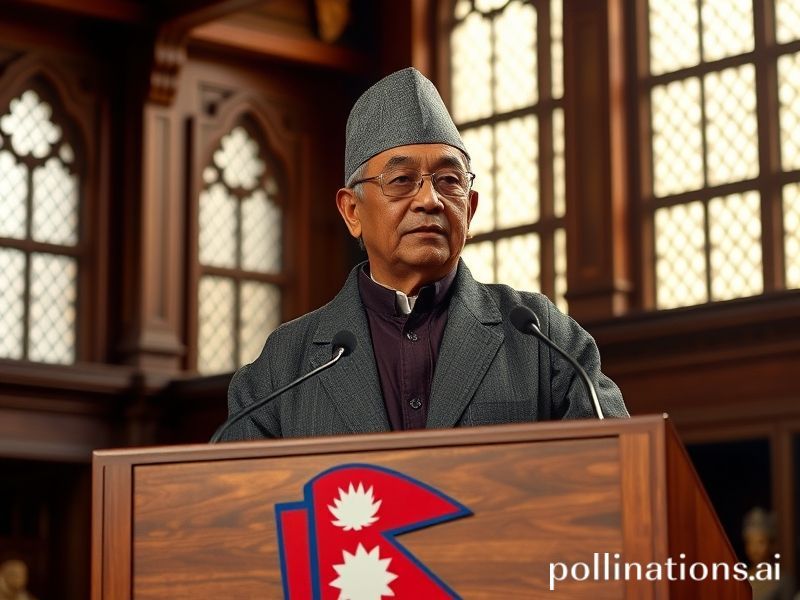Sher Bahadur Deuba’s Fifth Act: Nepal’s Gerontocracy Charms the World Again
Kathmandu’s weather is famously unreliable—monsoon one minute, smog the next—so it’s fitting that Sher Bahadur Deuba has popped in and out of the prime minister’s chair more often than a Himalayan teahouse changes its Wi-Fi password. On 13 July 2021, the 75-year-old liberal warhorse saddled up for his fifth non-consecutive term, a feat that would make even Italian premiers blush. The international community, which had spent the previous three years pretending Nepal’s communist love-in was permanent, suddenly remembered the country exists. Cue a flurry of congratulatory telegrams that read like LinkedIn endorsements from people you barely met at a conference buffet.
Deuba’s return is less a triumphant sequel and more a geopolitical director’s cut no one asked for. China, which had grown fond of the now-defunct Nepal Communist Party’s Belt-and-Road enthusiasm, must recalibrate its Himalayan charm offensive. India, still sulking after the 2015 blockade and the subsequent red-carpet rollout for Xi Jinping, sees Deuba—an old Delhi-friendly face—as a chance to reopen the “roti-beti” relationship, a phrase that translates roughly to “we’ll trade carbs and daughters, but don’t mess with our maps.” Meanwhile, the United States, fresh off announcing its Millennium Challenge Corporation grant (a.k.a. Washington’s polite way of asking, “Mind if we build a power line next to your yaks?”), is hoping Deuba’s liberal credentials will keep the cheque from bouncing.
Globally, Deuba’s fifth act lands on a planet exhausted by gerontocracy. From Washington to Westminster, voters are asking why the same faces keep popping up like Whack-a-Mole with pensions. Deuba, who first became prime minister when Bill Clinton was still apologizing for things, is Exhibit A. Yet in Nepal, age is currency; you can’t spell “experience” without “exp” and “er,” and Deuba has both in wrinkles. His supporters argue that only he can herd the fractious Nepali Congress, the Maoists, the Madhesis, and the occasional royalist ghost through the constitutional maze to elections next year—an event international observers will inevitably label “historic” even if turnout is 12 guys and a goat.
The cynical view, popular among Kathmandu’s Twitterati and every foreign correspondent nursing a hangover from the last Himalayan rave, is that Deuba’s resurrection merely reboots the same elite bargain: keep the aid flowing, the hydropower deals unsigned until the price is right, and the Everest climbing permits cheap enough for Instagram influencers to summit and litter in the same week. The World Bank, which has spent decades trying to convince Nepal that roads are more useful than yet another feasibility study, greeted Deuba’s appointment with the enthusiasm of a dentist discovering another impacted molar. Still, the international credit-rating agencies—those moody gatekeepers of capital—upgraded Nepal’s outlook to “stable,” proving that predictability, even of the geriatric variety, soothes markets more than revolutionary fervor.
Beyond the Himalayas, Deuba’s encore offers a darkly comic lesson in democratic resilience: you can change the constitution, abolish the monarchy, and federalize the mountains, but the same smiling septuagenarian will still find his way back to Baluwatar like a pensioned salmon. The UN, which maintains more acronyms in Nepal than the country has airports, quietly celebrated continuity; nothing terrifies bureaucrats more than having to reprint the name tags. Meanwhile, China’s Global Times accused unnamed “foreign forces” of orchestrating Deuba’s return, a claim as believable as a Yeti selfie but deliciously on-brand.
In the final ledger, Sher Bahadur Deuba’s fifth term is less about Nepal’s future than about the world’s inability to quit its comforting past. Climate summits will still debate melting glaciers while Deuba, who once negotiated with King Birendra, negotiates with Greta Thunberg’s TikTok generation. Investors will still dangle green bonds over rivers that have been promised hydro-dollars since the 1970s. And somewhere in a smoke-filled room in Kathmandu, Deuba will raise a cup of sweet milky tea, smile that practiced, weary smile, and remind everyone that the Himalayas, like his career, have always been too big to fail and too stubborn to move. The rest of us, clutching our frequent-flyer miles and moral certainties, will pretend that this time it’s different. Spoiler: it’s not.







